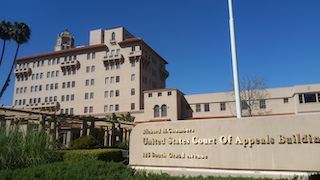On October 7, 2019, George Fower, aka Hisham Fehmi Faour, pleaded guilty in U.S. District Court for the Central District of California to one count of wire fraud, in violation of 18 U.S.C. § 1343. His crime resulted in victim losses of more than $1.2 million.
On February 10, 2020, the U.S. District Court judge James V. Selna sentenced Fower to 24 months’ imprisonment. With the government’s consent, Fower was allowed to self-surrender to the Bureau of Prisons (“BOP”).
Shortly thereafter, the COVID-19 virus became a significant health hazard in California and within prisons due to the lack of air circulation, close contact among prisoners and many with poor health.
Fower, who claimed he suffered from “serious and preexisting medical conditions,” including upper respiratory issues and bronchitis, therefore sought compassionate relief from his sentence to avoid serving time in prison because, he argued, his medical condition makes him “uniquely susceptible” to COVID-19.
18 U.S.C. § 3582(c)(1)(A) provides that “[T]he court, upon motion of the Director of the Bureau of Prisons, or upon motion of the defendant after the defendant has fully exhausted all administrative rights to appeal a failure of the Bureau of Prisons to bring an motion on the defendant’s behalf or the lapse of 30 days from the receipt of such a request by the warden of the defendant’s facility, whichever is earlier, may reduce the term of imprisonment (and may impose a term of probation or supervised release with or without conditions that does not exceed the unserved portion of the original term of imprisonment), after considering the factors set forth in section 3553(a) to the extent that they are applicable, if it finds that . . . extraordinary and compelling reasons warrant such a reduction; . . . and that such a reduction is consistent with appliable policy statements issued by the Sentencing Commission . . ."
Accordingly, Mr. Fower first addressed his administrative options to have his sentence reduced and avoid custody time. He first sought relief from the BOP on April 28, 2020, by sending a letter to the warden of Herlong Federal Correctional Institution, where U.S. Marshals told Fower he would be incarcerated.
On April 29, 2020, he sent a letter to the BOP’s Designation and Sentence Computation Center.
In both letters, Fower attached medical documentation.
 U.S. Ninth Circuit Court of Appeals Pasadena
U.S. Ninth Circuit Court of Appeals Pasadena
On October 16, 2020, he sent a letter to the BOP’s Regional Director for the Western Region (“Regional Director”). This letter included his previous submission to the Herlong Warden.
Finally, on November 27, 2020, he sent a letter to the BOP’s Office of General Counsel, attaching his letter and submissions to the Regional Director.
He did not receive any response to any of the letters and all the time, Fower remained out of custody.
On December 28, 2020, he filed his motion for compassionate release. He argued that he was “at serious risk of death if he contracted the virus . . . he warranted a sentence reduction to home confinement or time served.”
The U.S. District Court denied the motion, explaining that: (1) “compassionate release is not available for a defendant not in custody;” (2) Fower had not exhausted his administrative remedies” and “exhaustion is a statutory requirement for the grant of relief"; and (3) compassionate relief if Fower’s case would not be consistent with § 3553(a) sentencing factors and “would ill serve justice in the context of a million-dollar fraud.”
Fower then appealed to the U.S. Court of Appeals for the Ninth Circuit in Pasadena. Such a motion is reviewed for an abuse of discretion. United States v. Aruda (9th Cir., 2021) 993 F.3d 797, 799.
The Ninth Circuit affirmed the District Court, agreeing that the statute is written in a way that shows it only applies to defendants in custody, as 3582(c)(1) refers to “unserved portion of a term.”
Moreover, what Fower really seemed to be requesting was a resentencing request. The court then went on to explain that there have been approximately 5,400 applications between 2013 and 2017 for compassionate release and only 6% have been approved. United States v. Jones (6th Cir., 2020) 980 F.3d 1098, 1104. Of those that have been approved, the large majority were for prisoners suffering from terminal illness.
We bring this short article to the reader’s attention because compassionate release is a frequent topic of questions we receive in phone calls to our office.
The citation for the United States Court of Appeals for the Ninth Circuit ruling discussed above is United States v. George Fower (9th Cir. 2022) 30 F. 4th 823.
For more information about compassionate relief or release, please click on the following articles:
 U.S. Ninth Circuit Court of Appeals Pasadena
U.S. Ninth Circuit Court of Appeals Pasadena